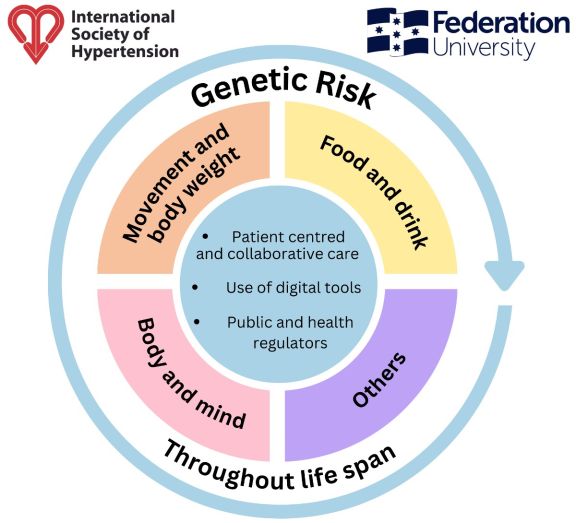New research reveals lifestyle changes to combat high blood pressure
21 September 2023

Mindfulness practices such as meditation and yoga should be recommended to people with high blood pressure, according to a comprehensive review of lifestyle changes related to hypertension by researchers at Federation University.
The international team of experts was led by academics from The Healthy Regions Intervention (THRIVE) group at Federation comprising Professors Fadi Charchar, Colette Browning, Britt Klein, Shane Thomas and Dr Priscilla Prestes. It was recently published in the Journal of Hypertension from the International Society of Hypertension (ISH) and has also been endorsed by the European Society of Hypertension and the World Hypertension League.
The paper makes recommendations on effective lifestyle changes for blood pressure control, based on the latest clinical and scientific evidence – with an emphasis on sleep quality and reduced exposure to air pollution – alongside existing recommendations such as maintaining a healthy weight, regular exercise and refraining from smoking.
Hypertension affects around 4 in 10 people worldwide, and although there are effective medications for treating high blood pressure, the best approach is often to start with lifestyle interventions before introducing treatment with medication if needed.
“Our aim was to provide a holistic set of recommendations for changes to lifestyle, which focus on all areas of health, including movement and bodyweight, food and drink, the body and mind, as well as other factors such as exposure to air pollution,” said Professor Charchar, Director of Federation’s Health Innovation and Transformation Centre (HITC) and lead author of the paper.
“Our recommendations apply across the whole life span. They are designed to help people with hypertension manage their condition, as well as help prevent the onset of the condition. These recommendations are for everyone.”
The authors recommend that healthcare professionals consider stress reduction and mindfulness-based therapies for people with high blood pressure, pointing to evidence that practices such as meditation, muscle relaxation, yoga and deep breathing techniques can all lower blood pressure.
 The research also revealed that all aspects of a patient’s sleep, including duration, quality and timing be examined, and recommended population-based awareness campaigns advocating for better sleep quality.
The research also revealed that all aspects of a patient’s sleep, including duration, quality and timing be examined, and recommended population-based awareness campaigns advocating for better sleep quality.
Evidence shows a strong relationship between exposure to air pollution and blood pressure. The authors of the paper said that, where possible, people should aim to reduce their exposure to outdoor air pollution, for instance by exercising in gardens and parks away from busy roadways. The authors highlight that, in this area, the greatest benefits would result from government action to improve air quality.
For physical activity, the authors recommend aerobic activity – like brisk walking or running – strength training, and isometric training, which are static exercises such as squeezing a hand grip.
They emphasise salt and sugar intake should be limited, with alcohol consumption ideally zero. The position paper also highlighted the role new digital technologies could play in lifestyle interventions.
Co-lead author of the paper Dr Priscilla Prestes said new technologies should also be used to improve health outcomes.
“The increasing use of apps and wearable technologies can help people track their movement, sleep and diet, as well as promote behaviour change, such as prompting a person to take increased exercise, especially incidental exercise.”
Related reading:
Telomeres research aims to revolutionise hypertension treatment
Kidney gene discovery unlocks door to high blood pressure answers


